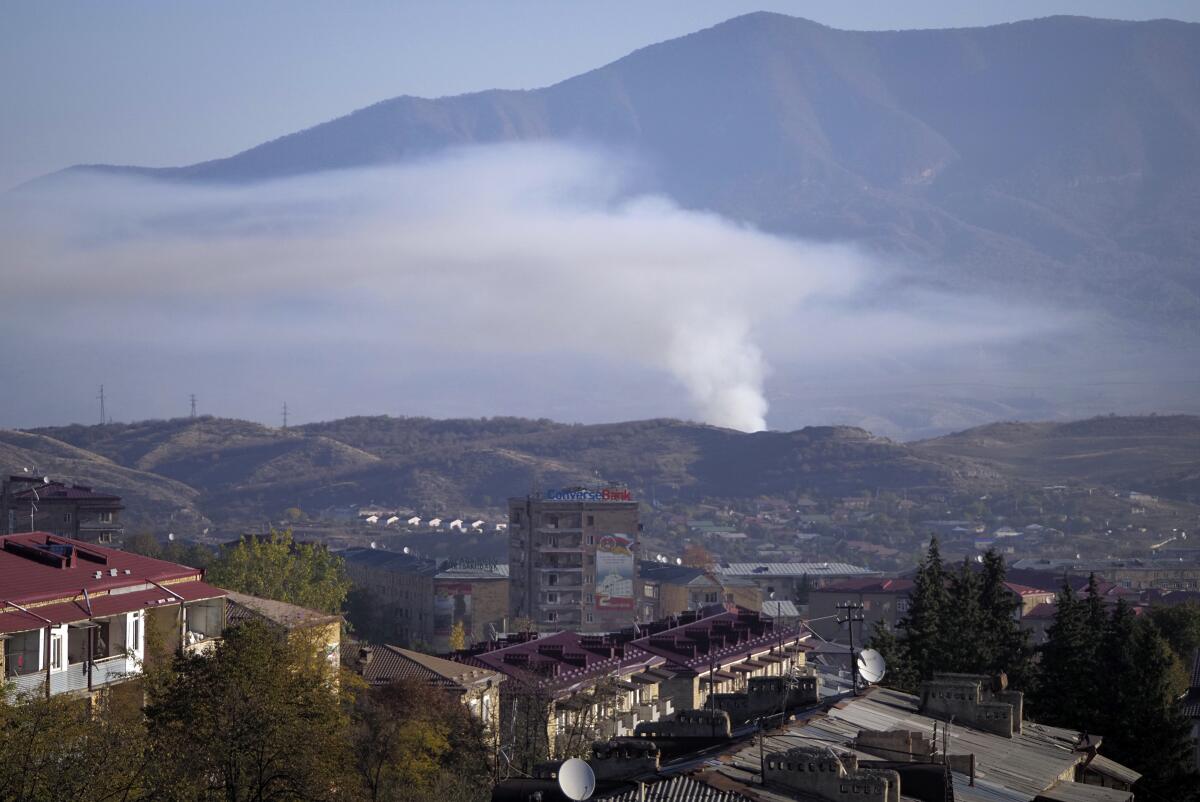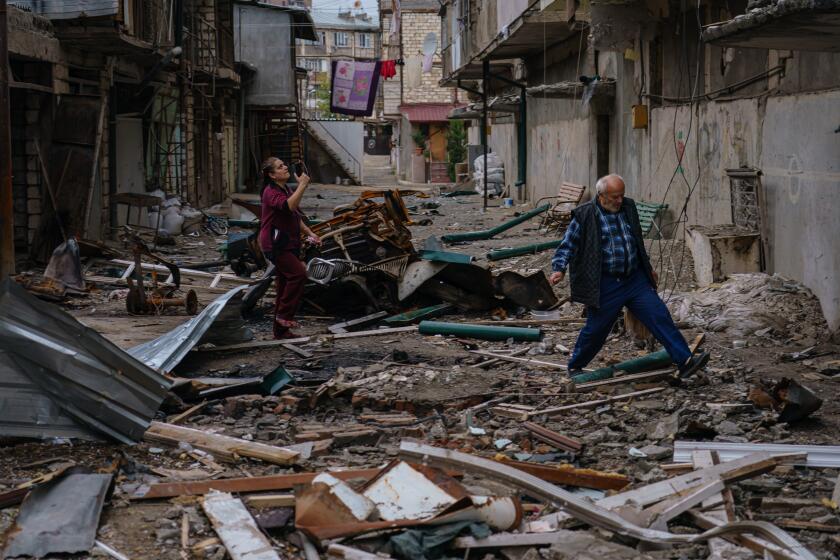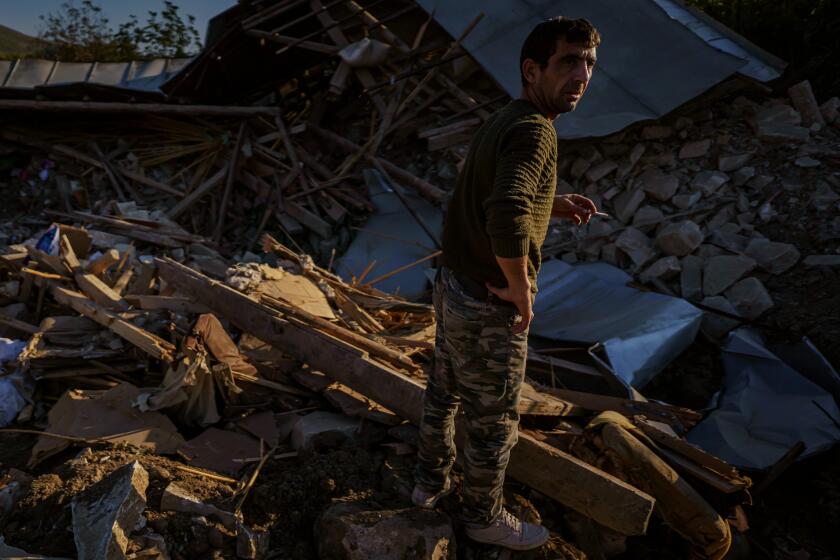New U.S.-brokered cease-fire takes effect in Nagorno-Karabakh, but will it hold?

- Share via
YEREVAN, Armenia — The latest attempt at a truce in the fighting over Nagorno-Karabakh — this one brokered by the U.S. — began Monday morning as Armenia and Azerbaijan reiterated their commitment to a peaceful resolution of their decades-old conflict over the region.
But whether this third try at a cease-fire will hold, after four weeks of hostilities, remains in question. Within hours of taking effect, both sides accused each other of violations.
The Azerbaijani Defense Ministry alleged that Armenian forces fired at Azerbaijani settlements and positions of the Azerbaijani army “along the entire front, as well as on the Armenia-Azerbaijan state border,” using various small arms, mortars and howitzers. Armenian military officials denied the accusations and in turn accused Azerbaijani forces of shelling the northeastern area of Nagorno-Karabakh and other areas.
Two previous Russia-brokered cease-fires also frayed immediately after taking effect.
The new truce began 8 a.m. local time Monday and was announced in a joint statement by the governments of the United States, Armenia and Azerbaijan.
U.S. Secretary of State Michael R. Pompeo said in a tweet Sunday night that the U.S. had facilitated “an intensive negotiation” and that Armenian Foreign Minister Zohrab Mnatsakanyan and Azerbaijani Foreign Minister Jeyhun Bayramov “have committed to implement and abide by the cease-fire.”
The hostilities raging in Nagorno-Karabakh lie at the heart of a decades-long fight that began during the chaotic breakup of the Soviet Union.
Russia, the U.S. and France, co-chairs of the so-called Minsk Group set up by the Organization for Security and Cooperation in Europe to mediate the conflict, also took part in the talks, Pompeo said.
In a separate statement, co-chairs of the group said they would meet with the Armenian and Azerbaijani foreign ministers in Geneva on Thursday “to discuss, reach agreement on and begin implementation ... of all steps necessary to achieve a peaceful settlement of the Nagorno-Karabakh conflict.”
Nagorno-Karabakh lies within Azerbaijan’s internationally recognized borders but has been under the control of ethnic Armenian forces backed by Armenia since a war there ended in 1994. The latest fighting, which began Sept. 27, has involved heavy artillery, rockets and drones, and killed hundreds of people in the largest escalation of hostilities between the South Caucasus neighbors in more than a quarter-century.
The deadly clashes have continued despite numerous calls for the cessation of hostilities and the two previous attempts at establishing a cease-fire.
The use of drones has upset the military balance between Azerbaijan and Armenia in their longtime dispute over the territory of Nagorno-Karabakh.
United Nations Secretary-General Antonio Guterres welcomed the cease-fire agreement and reiterated his appeal to Armenia and Azerbaijan to implement it without delay and “resume substantive negotiations without preconditions,” U.N. spokesman Stephane Dujarric said.
The U.N. chief urged the parties to allow unimpeded humanitarian access to Nagorno-Karabakh to deliver aid and “to make concrete steps towards a peaceful resolution of the Nagorno-Karabakh conflict,” Dujarric said.
According to Nagorno-Karabakh officials, 974 of their troops and 37 civilians have been killed in the clashes so far. Azerbaijani authorities have not disclosed their military losses, but say the fighting has killed 65 civilians and wounded 300.
Russian President Vladimir Putin said Thursday that, according to Moscow’s information, the overall death toll from the fighting was nearing 5,000, significantly higher than what both sides report.
Some Armenian Americans in Southern California have traveled thousands of miles to help in the war effort against Azerbaijan.
On Friday, Pompeo hosted the Armenian and Azerbaijan foreign ministers for separate talks, but the fighting raged on unabated.
On Sunday morning, the Nagorno-Karabakh army said battles continued “on all directions of the frontline,” and the Azerbaijani Defense Ministry accused Armenian forces of targeting several Azerbaijani regions. Armenian military officials reported “intense fighting” in the conflict zone throughout the day and “heavy battles” Sunday evening.
The new spate of violence has prompted concerns of a wider conflict involving Turkey, which has thrown its weight behind Azerbaijan, and Russia, which has a security pact with Armenia.
It has also worried Iran, which borders both Armenia and Azerbaijan. Iran has occasionally complained about stray mortar rounds and rockets that injured people and damaged buildings in rural areas near the borders.
Breaking News
Get breaking news, investigations, analysis and more signature journalism from the Los Angeles Times in your inbox.
You may occasionally receive promotional content from the Los Angeles Times.
Iran’s Revolutionary Guard said Sunday that it had deployed ground forces to the border near the area of the conflict, the country’s state radio reported. Gen. Mohammad Pakpour, chief of the guard’s ground forces, said that Iran would not accept any action that “violates” the security and peace of Iranian people in the region.
Armenia and Azerbaijan maintained they were committed to a peaceful resolution and blamed each other for hindering peace.
Azerbaijani President Ilham Aliyev has said that Armenian forces must withdraw from Nagorno-Karabakh to end the fighting. “A cease-fire cannot be without conditions. The truce is possible only after Armenian leadership announces withdrawing its troops from Azerbaijan’s occupied territories,” Aliyev said Sunday.
For his part, Armenian Prime Minister Nikol Pashinian accused Azerbaijan of taking a “non-constructive” stance in negotiations. “To solve this issue, we need mutual concessions. Every time Armenia expresses willingness to make any concessions ... Azerbaijan comes up with new demands, new conditions,” Pashinian said Sunday in an interview.
The announcement of the new cease-fire came several hours after those remarks.
More to Read
Sign up for Essential California
The most important California stories and recommendations in your inbox every morning.
You may occasionally receive promotional content from the Los Angeles Times.














